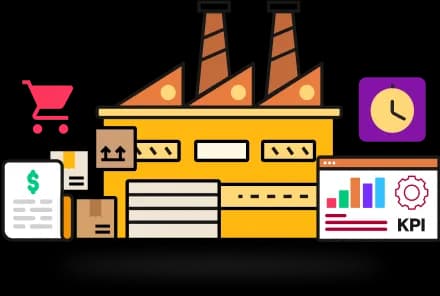Industry
Industrial Manufacturing
High Tech & Electronics
Footwear Manufacturing
Apparel & Textiles
Food & Beverage
Rubber & Plastics
Metal Fabrication
Industrial Machinery & Equipment
Construction & Engineering
Furnitures & Fixtures
Medical Device Manufacturing
Automotive Manufacturing
Aerospace And Defence
Screw Shop Manufacturing
Spring Shop Manufacturing
Solutions
Pricing
Resources
Company
Improve Patient Care Legacy
ERP for Healthcare Industry
Over the years enterprise resource planning (ERP) solutions have witnessed widespread adoption across a broad range of industries. ERP software helps to break data silos across multiple business functions, streamline information in various departments and automate tasks. ERP software has proven capabilities to augment productivity and increase profitability. An ERP software helps in managing key business functions such as financial accounting, inventory management, customer relationship management, and human resource management.
Need for an updated ERP system for healthcare organizations
The business requirements of ERP software in the healthcare industry is no different. Healthcare providers across the globe are hard-pressed to achieve twin objective: quality patient care and significant cost reduction. To this end, healthcare institutions are increasingly investing in upgrading their ERP systems to improve the accessibility and quality of patient care. In addition, minimizing clinical errors and increasing healthcare providers’ productivity are key motivations to adopt ERP solutions.
The constant influx of patents and various technologies made it necessary for hospitals and other healthcare institutions to integrate patient database with crucial information on doctors and employees. Doctors and clinicians need real-time information on their patients’ diagnostic reports to facilitate the communication and make their treatment and therapies more effective. In addition, various departments in hospitals need automated solutions to integrate their core services, support services and back-office operations. Reducing operational cost and overhead is one of the key motivations for adopting ERP solution. Streamlining information across pharmacy, laboratory system, radiology, picture archiving and communication system (PACS) and patients’ electronic medical records (EMRs) is vital. On the other hand, patients get access to the consolidated information of their medical reports to timely schedule the appointments and promptly make decisions.
Read: ERP Software for Hospitality Industry
Motivations of Implementing ERP software
Major motivations of implementing ERP software in hospitals are clinical and administrative – cost monitoring, operational efficiency, improving patient safety and boosting clinical outcomes. In modern healthcare system, emerging motivation to implement ERP solutions can be strategic at times. Increasing the effectiveness of various managerial processes to support organizational growth and enhance compliance with regional and global laws and regulations is a major objective of implementing ERP system in healthcare.
Benefits of ERP software in healthcare
Some of the key benefits of implementing ERP solutions are:
Better Patient Care: An ERP software helps healthcare providers to provide the patients with remote access to crucial databases and reports. This also helps the patients to make informed and prompt decision regarding treatment. An advanced automated software makes planning subsequent tests and medical procedures easier. ERP solution ensures the availability of crucial patient information across multiple systems.
Reduces Operational Cost: ERP as a part of IT automation software can result in process efficiencies. ERP brings various functions, such as accounts, finance, human resources and brings them under one common database. It helps to optimize different back-end operations such as payroll management, accounts management and inventory management.
Streamline Healthcare Processes: This is achieved by integrating core services such as patient registration, managing electronic medical records, radiology department, OPD and emergency.
Financial Planning: An ERP ensures payments from various managed care providers are reasonable, leading to a win-win situation for providers and payers. This also helps in maintaining profitability in healthcare institutions along with affordable patient care.
Adopting Best Practices: Healthcare institutions can efficiently manage all policies and procedures pertaining to member benefits, claims, enrollment, and provider’s networks, which keeps them updated with best industry’s practices.
Patient Safety: An ERP software enables healthcare providers to enhance safety by making the communication between the clinicians and patients transparent. An interactive ERP is considered by numerous institutions as an organizational mandate for bringing patient safety culture.
Read: ERP Software for Non-Profit Organizations
To Sum Up
Implementing ERP solution helps to bring healthcare providers, insurance providers and patients under one platform and keeps all the crucial information centralized. Easy-to-use and innovative ERP solutions by various providers help the healthcare professionals to focus on their key concerns—quality patient care and safety. Healthcare organizations are rapidly adopting ERP software to gain competitive edge and augment their bottom line. Increasing requirements for accountability and transparency have made the adoption of ERP faster. Further, leading healthcare institutions leverage on ERP system to be compliant – leading them to evolve rapidly.
Get Started with Deskera
Benefits of cloud business software
- Productivity
- Implementation
- Mobility
- Scalability
- Security
What our Customers Say About Us
Whatever your business
size, Deskera enables you to
simplify operations across
business functions. Here's
what our customers say
about us.


At GoDo, we understand that managing our finances and customer relationships is essential for our success. Deskera has provided us with an easy to use and intuitive platform that has enabled us to access our financial data, track customer relationships, and manage our finances with ease. We have been able to streamline our processes, better manage our finances, and stay on top of our customer relationships. We highly recommend Deskera to any business that is looking to stay organized and efficient.
Wesley Wright
CEO, GoDo Life


We are extremely pleased with our decision to switch to Deskera and have seen a significant improvement in our business operations since making the switch. The sales process was smooth from start to finish and customer support at every step of the implementation was stellar. Highly recommend Deskera to those looking for a great ERP solution.
Wally Mears
CEO, The Jungle

We implemented Deskera's integrated platform to improve our procurement and inventory management processes to streamline our operations and improve efficiencies. I highly recommend their platform to any company looking to accelerate their growth.
Scott Phetsalod
Laboratory Manager
Run Your Business With Deskera

Products
Use Cases
 , India
, India  , Singapore
, Singapore  , and Canada
, and Canada  with
with 


